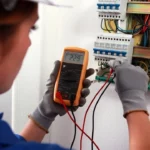Hey there! I’m Sam from Qualify Me!, Australia’s leading RPL (Recognition of Prior Learning) company. If you’ve been working in the construction industry for a while but don’t have formal qualifications, you’re probably already aware of how important a carpentry qualification can be in unlocking new opportunities.
Here at Qualify Me!, I’ve helped hundreds of people just like you turn their hard-earned skills into nationally recognised qualifications. Today, I want to talk about how getting your CPC30220 Certificate III in Carpentry can set you up for a successful career and how you can achieve this qualification quickly without going through years of training.
Why You Need a Carpentry Qualification
Let’s face it—Australia’s construction industry is booming, and qualified carpenters are in high demand. But without formal qualifications, you might be missing out on better pay, more jobs, and higher job security.
As I always say, “A formal qualification doesn’t just validate your skills—it opens doors to bigger and better projects.”
You might already have years of experience, but a nationally recognised carpentry qualification is what employers are looking for. It’s a must if you want to work on major construction sites or start your own carpentry business.
Fast-Track Your Carpentry Qualification with RPL
Here’s the good news: you don’t need to go back to TAFE or spend years in an apprenticeship to get qualified. With Recognition of Prior Learning (RPL), you can use the skills and experience you already have to fast-track your carpentry qualification.
At Qualify Me!, we’ve designed a streamlined process that’s quick and easy:
- Skills Assessment: We start with a free skills assessment to determine your eligibility.
- Portfolio of Evidence: You’ll gather proof of your experience (such as photos of your work, references, and certificates).
- Competency Check: We review your skills and ensure everything meets the standards.
- Get Qualified: Once everything’s in order, you’ll receive your nationally recognised carpentry qualification.
This process could save you years of formal training. And the best part? You’ll be ready to take on bigger roles and increase your earning potential.
"At Qualify Me!, we believe in turning your experience into qualifications fast, so you can keep moving forward in your career without slowing down."
The Skills You’ll Gain with a Carpentry Qualification
When you complete your carpentry qualification, you’ll gain a wide range of practical skills that are essential on any job site:
- Framing and formwork: You’ll learn how to construct the skeleton of buildings, which is a fundamental skill for any carpenter.
- Blueprint reading: Understanding how to read and interpret building plans is crucial for accurate construction.
- Building codes and safety regulations: You’ll be fully aware of Australia’s construction laws and ensure that every project meets safety standards.
These skills will make you stand out from the competition and give you the confidence to take on more complex projects.
Career Opportunities with a Carpentry Qualification
Once you’ve secured your CPC30220 Certificate III in Carpentry, you’ll have access to a wide range of job opportunities:
- Residential Carpenter: Work on homes, renovations, and extensions.
- Commercial Carpenter: Get involved in large-scale construction projects like office buildings, schools, or shopping centres.
- Formwork Carpenter: Specialise in creating the molds for concrete structures, an essential skill for infrastructure projects.
And if you’re thinking about starting your own carpentry business, a formal qualification is your golden ticket to get registered and insured as a contractor.
"With a carpentry qualification, you’re not just another tradie—you’re a skilled professional who’s ready to take on any job."
Frequently Asked Questions About Carpentry Qualifications
How long does it take to get a carpentry qualification through RPL?
The RPL process can be completed much faster than traditional training methods. At Qualify Me!, we typically see our clients qualify within a few months, depending on how quickly they can gather their evidence.
What is the CPC30220 Certificate III in Carpentry?
The CPC30220 Certificate III in Carpentry is the nationally recognised qualification for carpenters in Australia. It covers essential skills like framing, formwork, and blueprint reading.
Can I apply for RPL if I have informal carpentry experience?
Absolutely! Recognition of Prior Learning is designed for people who’ve gained their skills on the job, whether that’s through informal work or previous training.
Why should I get a carpentry qualification if I already have experience?
Without a formal qualification, you could be missing out on better job opportunities and higher pay. A carpentry qualification shows employers that your skills meet national standards and that you’re ready to take on more responsibility.
How does getting qualified through Qualify Me! help me locally?
As Australia’s leading RPL company, Qualify Me!, we specialise in helping local tradies fast-track their qualifications. This gives you an edge in your local job market, helping you stand out from the crowd and secure better contracts.
How to Get Started with Qualify Me!
Ready to take the next step? At Qualify Me!, we make the process as simple as possible. Whether you’ve been working as a carpenter for 2 years or 20, we can help you get your carpentry qualification fast. And if you’re looking for a local RPL company you can trust, you can always check out our Google reviews here.
"Getting your qualification shouldn’t slow you down. With Qualify Me!, it’s quick, easy, and tailored to your experience."
Conclusion
A carpentry qualification is the key to unlocking better job opportunities, higher pay, and more job security in Australia’s booming construction industry. With Qualify Me!, you can fast-track your certification and start enjoying the benefits of being a fully qualified carpenter.
Adult LLN :
The current elective unit TAELLN411 Address adult language, literacy and numeracy skills may become a core unit in the TAE40110 Certificate IV in Training and Assessment.
To work as a trainer in the VET sector a trainer must hold, as a minimum, the TAE40110 Certificate IV in Training and Assessment from the TAE10 Training and Education Training Package or be able to demonstrate equivalent competency. Many trainers will soon need to hold or demonstrate equivalent competency for, the unit TAELLN411 Address adult language, literacy, and numeracy skills - Supersedes TAELLN401A.
Contact Qualify Me & Register for TAELLN411 - Address adult language literacy and numeracy skills course
Here's a sweet snapshot of the course: Language can be said to cover all the modes and skills involved in listening, speaking, reading, and writing. It involves words, phrases, and sentences, the grammatical structures, whether spoken or written, including the use of idioms, slang, or jargon. Language is the primary way we communicate with each other. Whether a group or individual uses a lot of slang or has a teasing, joking culture, or relies on more polite and formal communications is all part of a particular language culture of their profession, trade, industry, community, or social.
Languages are constantly evolving with our desire to communicate effectively. We are all constantly and often unconsciously learning new words and ways of communicating with different groups of people throughout our lives. Literacy is essentially language in use. It is about reading and writing as well as the skills of speaking and listening including awareness of the types of tone and connotations associated with communicating in different work, social or cultural contexts. Like language, literacy is constantly changing over time as we develop new ways to communicate and debate or explain information. The ‘new’ literacies involved in technological communications whether by email or text messages mentioned above or the skills involved in accessing, applying, and using information or services offered on the internet highlight the changing nature of the literacy skills we need to operate in a technological world. We all need to be extending and developing our literacy skills in order to adapt to new situations in a rapidly changing world.
‘Numeracy’ refers to the application of mathematical skills in real situations related to a person’s life, work, and participation in their community. It involves interpreting mathematically related concepts and language, such as the graphs used in newspapers, or on TV during an election broadcast. It also includes the ability to keep up with new demands in the workplace. For example, the skills involved with calculating GST in the trades and in business rely on understanding the meaning of ‘%’ and the ability to calculate a simple percentage in the head. According to Australian research, this is beyond over 50% of our adult population.
Numeracy also incorporates spatial skills, including reading and interpreting two-dimensional plans and relating them to three-dimensional reality. It includes reading street directories and grid references; weighing and measuring; interpreting tables and standards; calculating and interpreting rates; recording data; calculating in the head; using calculators or other computational technologies. Numeracy includes the ability to make reasonable estimations and a feeling for ‘way out’ results when measuring or calculating.
It also incorporates using formulae (particularly those related to your workplace) and in some cases even the ability to transpose formulae. Confidence and ‘ownership’ of the mathematical skills are an important part of being numerate. This is one respect in which school mathematics education has let down many potential VET learners.
LLN in VET
Whether we are aware of it or not, LLN skills development is important for all study, formal and informal, at all levels including traineeships and apprenticeships, certificate and diploma programs, degree and postgraduate programs. How teachers and their students develop these skills is an important factor in determining the quality of any vocational program.
Get in touch with Qualify Me & Register for this course now













